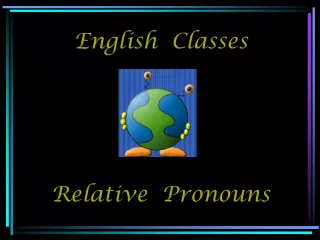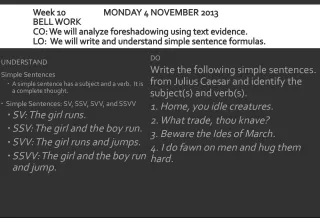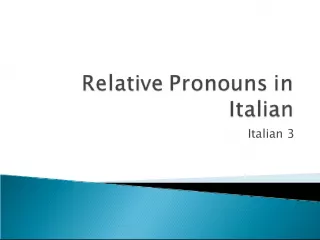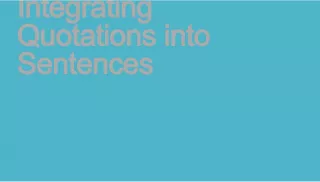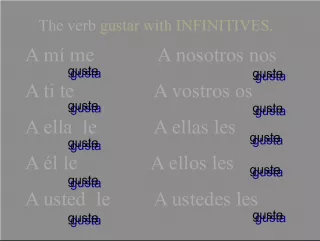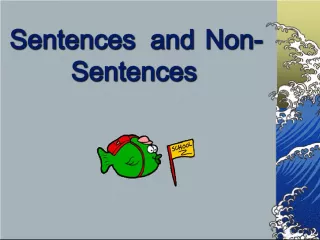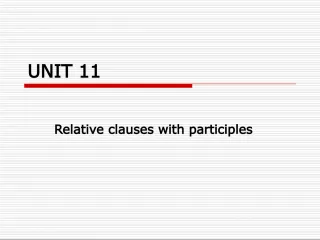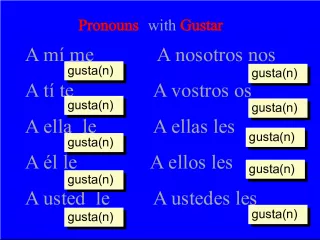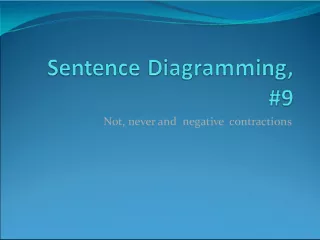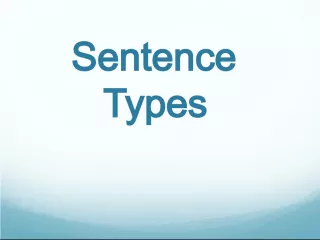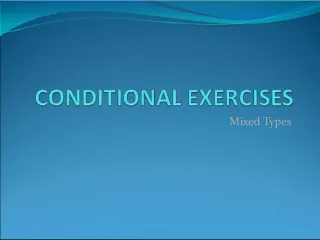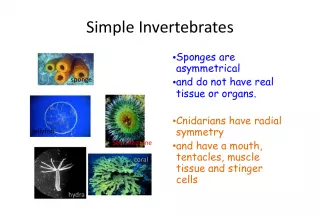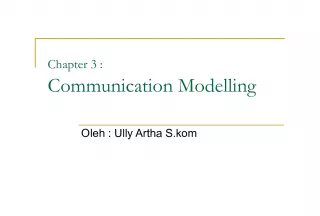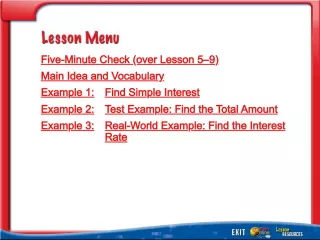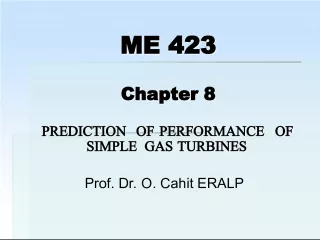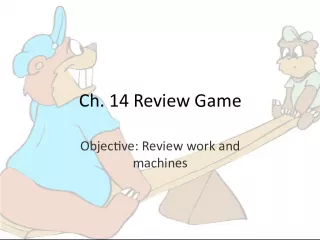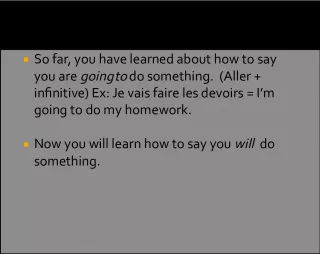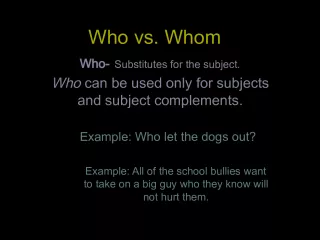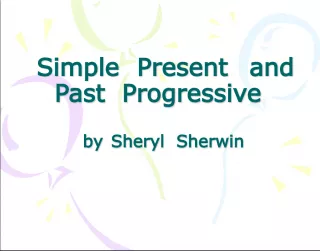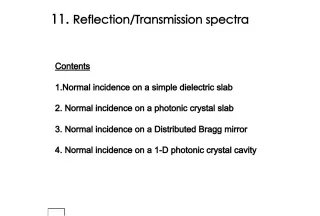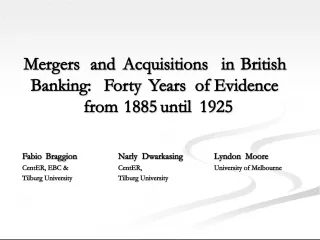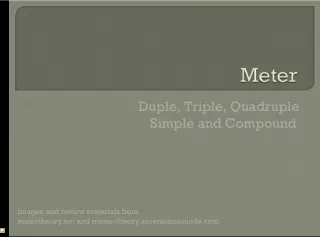How to use simple relative pronouns to merge two sentences into one
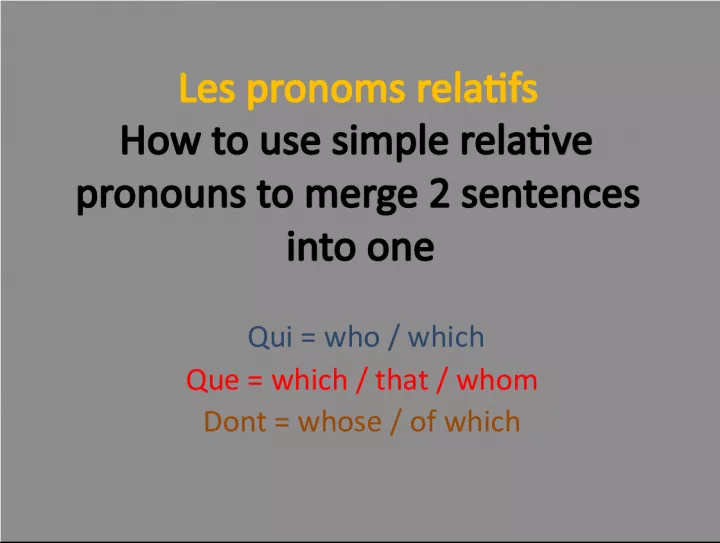

Learn how to choose between qui, que, and dont to combine two sentences into a more complex and concise structure without repetition.
- Uploaded on | 0 Views
-
 roopekauppila
roopekauppila
About How to use simple relative pronouns to merge two sentences into one
PowerPoint presentation about 'How to use simple relative pronouns to merge two sentences into one'. This presentation describes the topic on Learn how to choose between qui, que, and dont to combine two sentences into a more complex and concise structure without repetition.. The key topics included in this slideshow are . Download this presentation absolutely free.
Presentation Transcript
1. Les pronoms relatifs How to use simple relative pronouns to merge 2 sentences into one Qui = who / which Que = which / that / whom Dont = whose / of which
2. QUI or QUE ?? HOW TO CHOOSE?
3. STEP 1: Think of the way(s) your 2 sentences can be merged together in order to be more complex and avoid the repetition. . The man lives next door. The man is very nice. The man who lives next door is very nice. OR: The man who is very nice lives next door. . The book is red. The book is on the table. The book which is red is on the table. OR: The book which is on the table is red. . I saw a man. The man was dark haired. I saw a man who was dark haired. OR: The man (whom) I saw was dark haired. . I bought a book. The book was cheap. I bought a book which was cheap. OR: The book (which) I bought was cheap.
4. STEP 2: Identify what role the noun you want to replace has within the sentences. . The man lives next door. The man is very nice. Lhomme habite ct. Lhomme est trs sympa. (subject) (verb) (subject) (vb) . The book is red. The book is on the table. Le livre est rouge. Le livre est sur la table. (subject) (verb) (subject) (vb) . I saw a man . The man was dark haired. J ai vu un homme . Lhomme tait brun. (subj) (vb) (object) (subject) (vb) . I bought a book . The book was cheap . J ai achet un livre . Le livre tait bon march. (subj) (vb) (object) (subject) (vb)
5. STEP 3: Choose the correct relative pronoun depending on the role it has within your sentence. You use qui not when the word youre referring back to (the noun it replaces) is the subject of the verb coming after the qui. Similarly, you use que when the word youre referring back to (the noun it replaces) is the object of the verb coming after the que .
6. Qui = who/which You use qui not when the word youre referring back to is the subject of the verb coming after the qui : Lhomme habite ct. Il est trs sympa. (subject) (verb) Lhomme qui habite ct est tr s sympa. = The man who lives next door is very nice. Lhomme qui est tr s sympa habite ct. = The man who is very nice lives next door.
7. Qui = who/which You use qui not when the word youre referring back to is the subject of the verb coming after the qui : Le livre est rouge. Le livre est sur la table. (subj) (verb) (subj) (vb) Le livre qui est rouge est sur la table. = The book which is red is on the table. Le livre qui est sur la table est rouge. = The book which is on the table is red.
8. Que = who/which Similarly, you use que when the word youre referring back to is the object of the verb coming after the que : J ai vu un homme . Lhomme tait brun. (subj) (vb) (object) (subject) (vb) J ai vu un homme qui tait brun. = I saw a man who was dark haired. Lhomme que j ai vu tait brun. = The man (whom) I (object) (s) (vb) saw was dark haired.
9. Que = who/which Similarly, you use que when the word youre referring back to is the object of the verb coming after the que : J ai achet un livre . Le livre tait bon march. (subj) (vb) (object) (subject) (vb) Jai achet un livre qui tait bon march. = I bought a book which was cheap. Le livre que j ai achet tait bon march = The book I (object) (s) (verb) bought was cheap.
10. Attention! It is important to remember that que is never omitted in French you cannot say: Lhomme jai vu or Le livre jai achet .
11. DONT can be much trickier to use When do we use it??
12. Dont is the equivalent of the relative pronouns of which or whose 1. Whose + noun , followed directly by a verb = very straightforward!! The girl whose hair is curly is my friend. The girl whose dad is divorced is lovely. The book whose author is French is boring. Use dont where you have whose in English the word order stays the same: La fille dont l es cheveux sont fris s est mon amie . La fille dont le p re est divorc est adorable . Le livre dont lauteur est fran ais est ennuyeux .
13. Dont is the equivalent of the relative pronouns of which or whose 2. Whose + noun + subject + verb = not so straightforward anymore! The girl whose hair I have cut is my friend. The girl whose dad my parents like is lovely. The book whose author we are studying in class is boring. Use dont where you have whose in English BUT the word order changes after dont in French: La fille dont j ai coup les cheveux est mon amie. La fille dont mes parents adorent le p re est adorable. Le livre dont nous tudions lauteur est ennuyeux.
14. Dont is the equivalent of the relative pronouns of which or whose 2. Whose + noun + subject + verb = not so straightforward anymore! In English, the order is: whose / object / subject / verb . In French, the order is: dont / subject / verb / object .
15. Dont is also used with all verbs followed by the preposition de Even if there is no preposition in the English verb (like to need/to remember etc ): Avoir besoin de : Le livre dont jai besoin = The book I need Se souvenir de : La chose dont je me souviens le plus = The thing I remember the most Avoir peur de : Le chien dont les enfants ont peur = The dog the children are afraid of Parler de : Laffaire dont nous parlons = The matter were talking about Etre fier de , soccuper de, avoir envie de, rire deetc.
16. Exercice : qui, que,dont? ll habite Valras ___ se trouve sur la cte. C'est vous ___ avez eu cette ide? Pierre possde un tableau ___ il ne connat pas l'origine. Les enfants ____ je moccupe sont gentils. Le thtre est quelque chose ___ m'intresse beaucoup. Je n'ai pas trouv le livre ___ je cherchais. Notre maison est celle ____ la porte est bleue.
17. Exercice : qui, que,dont? ll habite Valras QUI se trouve sur la cte. C'est vous QUI avez eu cette ide? Pierre possde un tableau DONT il ne connat pas l'origine. Les enfants DONT je moccupe sont gentils. Le thtre est quelque chose QUI m'intresse beaucoup. Je n'ai pas trouv le livre QUE je cherchais. Notre maison est celle DONT la porte est bleue.
18. QUI, QUE ou DONT? 1.Voici la situation ______ je tai parl et _______ sempire. 2.Le garon ______ se trouve l-bas et ______ mange une glace, est mon petit frre. 3.Mon chef veut que je reste tard ce soir pour finir le travail _____ je nai pas termin. 4.La musique ______ jaime le plus, est le rap. 5._______ est la porte et _______ veut-elle ? 6.Ma mre ________ est avocate et ________ travaille en ville, veut se rorienter. 7.La voiture ______ jai achete lautre jour et _____ ma cot une fortune est dj tombe en panne! 8.Les problmes financiers _______ javais lan dernier et _________ je tavais parl, se sont enfin rsolus. 9.Mon lyce, _____ jadore et _______ se trouve en ville, sest fait cambrioler. 10.Lacteur ________ je tai parl vient de sortir un nouveau film. 11.Le prof ________ on ne dit que du bien est en effet le meilleur que jai jamais eu! 12.La lettre ________ vous avez reue hier minquite.
19. Now merge the following sentences into one. 1. Paul avait une vieille voiture. Jai achet sa voiture. = Paul avait une vieille voiture 2. Jai achet la voiture de Paul. Paul est anglais. = Paul
